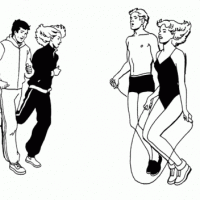Lose Weight > Weight Loss Tips > Weight Loss Articles > 5 Tell-tale Signs That You Have Hit A Weight Loss Plateau
5 Tell-tale Signs That You Have Hit A Weight Loss Plateau
1. The scale isn't moving
2. Clothes aren't getting bigger
3. You're hungry all the time
4. Exercises aren't as difficult
5. You're doing the same things, but not getting any results
What's most frustrating about these signs is the fact that it might seem like you're doing everything right. You're eating what you're supposed to be eating, working out when you plan to, and even cutting back further than you have to on your chosen diet plan. What's going on?
What causes a weight loss plateau?
Thankfully you can generally blame Mother Nature for your metabolic frustrations. What happens is that as your body changes, it starts to get 'used' to the new weight and wants to settle there. Your body has given you as many results as possible using the current menu and fitness program you're on.
The reason why your body does this is to avoid starvation. It senses that it's not getting as much food as it used to and so it tries to hold onto what you're giving it. Or it's getting used to the exercises that you're doing, so it's not responding in the same way. Basically, your body is leveling out - hence, the term plateau.
What can you do?
But now that you know what a plateau is and what the signs of it can be, you can start to tailor your weight loss routine to prevent or stop a plateau. What you need to do is change up what you've already been doing so that your body has to respond. This can include several things:
- Increase your calorie intake slightly
- Increase the intensity of your exercise plan
- Try adding more protein to your diet
- Drink more water
These simple steps can sometimes recharge your body and put it back into fat-burning, weight-losing mode. A weight loss plateau is something that every dieter will see at one point or another, so don't feel like you're not heading in the right direction. Often, a plateau is that sign that you're doing a good job already, but that you need to tweak something.
Are you to blame?
Some dieters are anxious to blame their plateau on physiological changes, rather than looking first to see if they are causing the plateau. Ask yourself these questions:
- Have you been watching your calories?
- Have you been exercising at a high intensity?
- Have you been exercising regularly?
If you're not sure that you can answer these questions in the affirmative, you might want to rethink your current actions before you start blaming the plateau on other things.
You can start keeping a food journal and writing down your exercise minutes to see if you could work a little harder. Maybe you've been eating more fatty foods and you just haven't realized it. Or maybe it's time that you try to workout out at a faster pace than you have been.
A weight loss plateau is going to happen at one point or another, but instead of sitting still and suffering through it; you know what to do to overcome it and continue on the path to your weight loss goals.
Related Articles
-
Diet Solution Program Ebook
In this day, dieting is not easy and many people choose an extreme met
-
3 Fast Tips to Lose Weight
If you need to lose weight fast you have probably heard by now that yo
-
Mesotherapy vs. Cellulite For A Knockout
In the battle to look good, theres a cosmetic treatm
-
Do not buy Emagrece Sim Diet Pills Until You Read This
If you are tired of trying out so many workouts or dieting systems ou
-
How Does Formoline Work
Excessive weight gain results in a condition where the essential body
-
Fun, Fast, Easy Way To Lose Weight
Do you find losing weight or dieting, for that m
- DON'T MISS
- BuildingMoreThanBodies: Best Proteins For Burning Body Fat and Building Lean Muscles and Strong Bone
- Money Saving Tip - Buy Older Running Shoes
- Vital Dieting Facts To Be Aware Of
- Every Other Day Diet Foods
- Acai Force Max Review
- Yoga As An Aid To Weight Loss
- Food Cravings: Use EFT to Learn Patience
- Fat Burning Furnace - How Lose Weight Fast with Techniques You Never Heard!
- How to Lose Weight Fast in a Week - Is it Really Possible?
- The Right Queens Fitness Center




